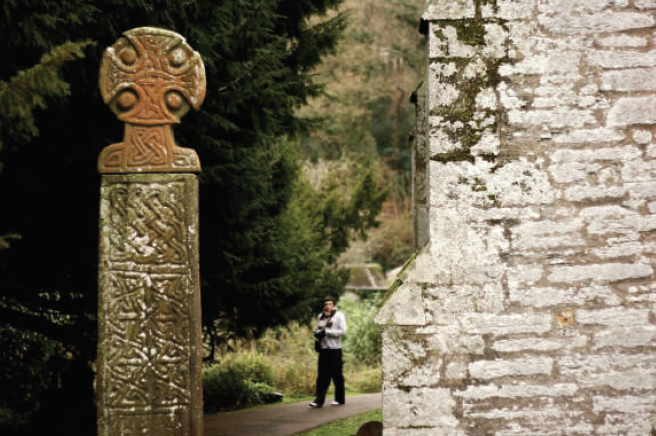News
Church welcomes Welsh law to protect history


Legal protection: The ancient Nevern Cross at St Brynach’s Church, Nevern, Pembrokeshire
HISTORIC churches hope to benefit from the first Wales-only legislation to protect Wales’ built heritage.
The Historic Environment (Wales) Bill, passed this week by the National Assembly for Wales, will introduce new measures to protect Wales’ historic environment, including churches and ancient monuments in churchyard, when it becomes law next month.
Alex Glanville, head of property services for the Church in Wales, said, “We congratulate the Welsh Government on the completion of this Bill. The consultative and preparatory work behind it has been exemplary and we look forward to working with the Welsh Government on aspects arising from the Bill – in particular future guidance on ecclesiastical buildings and the newly formed Welsh Places of Worship Forum.”
The Church in Wales owns 1,352 churches actively continuing worship and ministry across Wales, two-thirds of which are listed buildings. 147 of these are Grade 1 Listed buildings (29% of all Grade 1 Listed buildings in Wales) which include our six Cathedrals. Many of our churches are regularly open to the public and together attract two million visitors each year.
The new Bill includes powers to take urgent action to stop unauthorised work to historic sites and to prevent historic buildings from falling into disrepair.
Once the Bill is law, Wales will also become the first country in the UK to put historic environment records on a statutory footing – a measure that stakeholder groups have been calling for across the UK. These records allow advice on decisions by planning authorities and land managers to be based on sound information. They will also provide access to the new list of historic place names in Wales – another first for Wales.
The Deputy Minister for Culture, Sport and Tourism, Ken Skates, said, “Wales’ rich historic environment extends beyond our well-known ancient monuments and historic buildings. It also includes historic parks and gardens and our country’s great legacy of historic place names, both of which will, for the first time, be placed on statutory registers.
“Our heritage tells the fascinating story of our past; it brings social and cultural benefits; and it makes a significant contribution to our economy through tourism. It is something that people really care about. We often see anger and concern when people are made aware of the deliberate neglect of a listed building or the careless destruction of a scheduled monument.
“The Bill has been the result of extensive conversations with heritage professionals, voluntary organisations and the public. This gave us a clear idea of the challenges and the need for effective and flexible mechanisms for how we manage change.
“I am proud that in passing this Bill we are giving greater protection to our historic environment, raising awareness of its significance and supporting its sustainable management. Our outstanding historic sites and buildings need this protection so that they can continue to fascinate and inspire people for generations to come.”
The Bill will also simplify some of the systems in place for the management of scheduled monuments and listed buildings by allowing owners to enter into voluntary heritage partnership agreements with consenting authorities.
It will make it more difficult for individuals who damage protected monuments to escape prosecution by pleading ignorance of a monument’s status or location.
It will allow the development of a system of preservation notices and will give local authorities new ways to recover their costs when they have to take direct action.
It will also create an independent panel to provide the Welsh Ministers with expert advice on policy and strategy; introduce formal consultation with owners of buildings or monuments before a decision to protect them is made, and extend the definition of what can be protected as an ancient monument to include some battlefield sites and prehistoric settlements.
The Bill will become an Act when it receives Royal Assent in March 2016.
News
Wales name squad for Six Nations opener against England

Lake to captain side at Twickenham as Macleod set for tournament debut
WALES national rugby union team have confirmed their starting XV for the opening match of the Six Nations Championship, with captain Dewi Lake leading the side into Saturday’s clash with England national rugby union team at Allianz Stadium Twickenham.
Kick-off is at 4:40pm, with live coverage on ITV1 and S4C.
Lake starts at hooker and anchors a front row that includes Nicky Smith at loosehead and Archie Griffin at tighthead, the latter having made his international debut against England during the 2024 campaign.
Dafydd Jenkins partners Adam Beard in the second row, while Josh Macleod earns a first Six Nations start at openside flanker. He is joined in the back row by Alex Mann on the blindside and Aaron Wainwright at No. 8.
Tomos Williams is selected at scrum-half alongside fly-half Dan Edwards.
In midfield, Eddie James makes his second Test start at outside centre, pairing with Ben Thomas. Out wide, Josh Adams and Ellis Mee are named on the wings, with Louis Rees-Zammit returning at fullback for his first Six Nations appearance since 2023.
Bench strength
Wales opt for a six-two split among the replacements.
Tomas Francis is set to make his first international appearance since the 2023 Rugby World Cup, with Liam Belcher and Rhys Carre providing additional front-row cover.
Harri Deaves, Ben Carter and Taine Plumtree complete the forward options, while Mason Grady and Kieran Hardy offer backline reinforcement.
Tandy: “We want to attack the game”
Head coach Steve Tandy said the occasion and rivalry would bring extra intensity.
“Wales v England is always special given the history between the two nations,” he said.
“We know they’re playing some outstanding rugby and they’re in great form, but representing Wales means everything to this group.
“The squad have trained brilliantly this week. We want to get out there, attack the game and give the best account of ourselves. Opening the Six Nations at Twickenham is historic and we can’t wait.”
Speaking about Macleod’s selection, Tandy added: “Josh has had tough luck with injuries, but the way he’s come back — his leadership, his preparation and the intensity he brings — has been excellent. It’s great to see him get this opportunity.”
Community
Community exhibition showcases ateb customers’ creativity at Torch Theatre

A NEW pop-up exhibition celebrating local history, identity and creativity is set to open at the Torch Theatre in Milford Haven, showcasing artwork created by customers and partners of ateb Housing Association.
The free exhibition brings together a year’s worth of creative work produced through the Wales REACH project, which encourages participants to explore Pembrokeshire’s heritage while building confidence, skills and social connections.
Through workshops, visits and shared activities, residents have developed a varied collection of personal and community-focused pieces reflecting their own experiences and the stories of the county.
Among the featured works is Museum in a Bag, a reflective look at identity and self; REACH for the Landsker Line, which examines Pembrokeshire’s cultural divide through Norman castles and the Welsh language; and REACH Back in Time, a textile sculpture inspired by the history of Milford Haven.
An interactive scroll will also be on display, inviting visitors to add their own memories and reflections, alongside an oral history recorded by an ateb customer and disability rights advocate, offering a powerful first-hand account of life and resilience.
Organisers say the project has had clear benefits beyond the artwork itself.
Rex, an ateb customer who took part, said: “I have enjoyed the planned sessions – being able to get out and about and take part in the activities where possible. I also enjoyed the social aspect, mixing with other residents, sharing our local knowledge of the area and learning new facts.”
Another participant, Joan, added: “It has revived my school-level love of history. I am loving all the given work with interest.”
Project Officer Anne Kerr-Hughes said she had seen noticeable improvements in wellbeing and confidence.
She said: “We’ve noticed so many positive changes – from people trying new things and learning new skills to gaining the confidence to travel independently. One lovely outcome has been more residents using the local bus service after trips to the archives in Haverfordwest. It’s been heart-warming to see.”
The Wales REACH project has been supported by funding from The National Lottery Heritage Fund, with partners including Open University in Wales, Amgueddfa Cymru and People’s Collection Wales.
The exhibition runs from Tuesday, February 10 to Saturday, February 14, with visitors welcome to drop in during opening hours.
Entry is free and open to all.
Entertainment
Community film season launches at Torch Theatre with audience-picked programme

Grant from Ffilm Cymru Wales helps bring affordable independent cinema to Pembrokeshire
A SEASON of independent films chosen by local audiences is coming to Milford Haven this spring, as the Torch Theatre hosts a special programme designed to celebrate bold storytelling and community cinema.
Running from February through to mid-April, the Community Choices season has been made possible thanks to Wales-wide grant funding from Ffilm Cymru Wales. The scheme supports independent exhibitors to bring diverse and inspiring films to screens across the country.
At the Torch, audiences were invited to take part in programming workshops to help select the titles themselves. The final line-up reflects a mix of Welsh-language work, environmentally themed films and stories that break down social and economic barriers, ensuring something for all tastes.
Chelsey Gillard, the theatre’s Artistic Director, said: “We asked you, the people of Pembrokeshire, what films you wanted to see at the Torch – and we listened. There’s a terrific variety in this season, from family favourites to powerful dramas. We’re very grateful to Ffilm Cymru Wales for the funding that allows us to bring these wonderful films to the big screen, and we look forward to giving everyone a warm Torch welcome.”
The programme opens with Mr Burton on Sunday, February 8 at 4:15pm, followed by Flow on Tuesday, February 17 at 4:45pm. Fantastic Mr Fox screens on February 19 at 4:45pm, with Moonlight closing the month on Friday, February 20 at 6:15pm.
March’s line-up includes Born Free on March 4 at 2:15pm, Earth on March 12 at 11:00am, Sinners on March 15 at 7:00pm, Booksmart on March 22 at 2:00pm, and Gwledd (The Feast) on March 27 at 8:00pm.
The season continues into April with I Swear on April 2 at 2:00pm, One Battle After Another on April 5 at 4:00pm, and This is Spinal Tap on April 12 at 4:00pm, bringing the Community Choices series to a close.
All tickets are priced at £4 and include a free tea or coffee, helping to keep the screenings affordable and accessible for everyone.
For tickets and full details, visit the Torch Theatre website or call the box office on 01646 695267.

-

 Health7 days ago
Health7 days agoConsultation reveals lack of public trust in health board
-

 Crime18 hours ago
Crime18 hours agoSex offender jailed after living off grid in Pembrokeshire and refusing to register
-

 News2 days ago
News2 days agoPrincess of Wales visits historic Pembrokeshire woollen mill
-

 Crime6 days ago
Crime6 days agoPembroke man accused of child sex offences sent to Swansea Crown Court
-

 Health4 days ago
Health4 days agoDoctor struck off after sexual misconduct findings at Withybush Hospital
-

 Crime2 days ago
Crime2 days agoHakin man’s appeal delayed again as Crown Court seeks guidance on insurance law
-

 Community6 days ago
Community6 days ago50s women threaten legal action over pension compensation refusal
-

 Business7 days ago
Business7 days agoEight-year prison sentence after vehicle stop uncovers drugs worth over £150,000



























